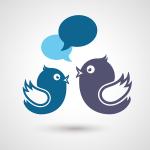“Just be yourself,” is one of the most common pieces of advice people offer when someone they know is getting ready for a job interview, about to make a presentation or even going on a first date. When an organization is about to let their sales team introduce themselves to the world on a social media channel like Twitter, however, there are some other rules of thumb that are arguably a lot more important.
The great thing about Twitter is that anyone is free to go on, create an account and begin sharing posts (or “tweeting”) about whatever they like. Though it’s been adopted by businesses of all kinds with corporate accounts that help with everything from marketing to customer service, the best practices for individual employees hasn’t always been clear. Does everyone on the sales team need to be on Twitter? If so, what should they say? And what about all the things they shouldn’t say?
Answering some of these questions will depend a lot on the organization, its objectives and the makeup of its particular team. Keeping all sales people off Twitter, however, is a losing proposition. Being in sales means being part of relevant conversations with customers, and the fact is that a lot of those conversations are now happening on Twitter. Customers are likely to be tweeting about their business challenges, their goals and asking for advice as much as they might be tweeting about what they had for lunch or where they’re going on vacation. Just like an industry conference or even a cocktail party, sales reps need to know how to socialize on Twitter with ease and comfort.
The delicate balance for employers is making sure sales people can use their distinctive voices without tweeting things that may have an adverse effect on the company’s brand, its reputation or — worst of all — its customer relationships.
Take a look at the list of rules below. Even if you disagree with some of them, bring them up in your next sales team meeting to discuss with your reps. Some of them may be on Twitter already. Others might be reluctant to do so out of fear of making a misstep. Tweak and mold these into a set of guidelines that makes sense for the group, and revisit it as everyone’s use of Twitter matures over time.
1. Don’t Use Twitter As A Place To Make The Hard Sell
Even though Twitter doubled its original 140 character limit, there’s still not a lot of room to express yourself on the service. Sales pros might therefore be tempted to tweet primarily when the firm has a new product to offer, an updated version or a special promotion. They might even ask the marketing team for some help crafting the perfect one-liner pitch.
This is not, however, what Twitter was designed to do. Customers know they can get this kind of information by other means. They’re likely on Twitter because they want to have a genuine conversation, where ideas are exchanged. This should be where sales people devote the bulk of their effort on Twitter.
2. Make Twitter A Place To Offer Advice, Tips And Inspiration
We’ve all been part of e-mail chains at work, where someone has forwarded something helpful or simply funny to a group of coworkers. Twitter is a bit like that, except it’s not restricted to your own organization but can (theoretically) reach the entire world. Given that sales people are often lifelong learners and avidly gather up new proof points or insights to help them make a better pitch, they can seed their next calls or in-person conversations by offering links to articles, videos and other content their followers might enjoy.
3. Use Retweeting As A Form Of ‘Talking’
You don’t have to come up with original ideas of your own to share on Twitter every hour. Retweeting — where you share someone else’s tweet with your followers — is a way of amplifying ideas that you agree with. Some Twitter users make mention in their bios that “retweets are not endorsements” because they like to share ideas that explore alternative angles, but sales people simply need to make clear — maybe by adding a short note in the retweet — the context in which they’re passing on the information. Retweeting a customer’s insights (or pressing the “love” button) can be flattering, while retweeting updates from the company’s Twitter account can help spread a message more granularly to specific kinds of followers.
4. Listen As Much As You Tweet
Great salespeople know you can’t get anyone to make a purchase by talking so loudly and constantly that a customer can’t get a word in edgewise. The same principle is true on Twitter. There’s nothing wrong with sales people being social media bystanders of sorts, especially in the beginning. Tune into a Twitter chat and comment only as appropriate. Use the “reply” button to share your feedback, ask questions and soon you can start to generate a thread that becomes really interesting to those involved and even other followers who don’t participate directly.
5. Don’t Be A Company Spokesperson
There will be occasions where sales people will see things on Twitter about their company’s products, its business decisions and even comments about their leadership team. The temptation, naturally, is to respond, but in most cases there will be others within the organization better positioned to do so. Develop some scenarios that spell out when sales team members can simply pass on Twitter comments and questions to those in customer service or corporate communications, or how they should direct those who approach them with matters outside their purview on Twitter. Some people will even add “views are my own” in their bio just to be safe.
Twitter may never become where sales people close many deals or crush their quotas. It could, however, become a channel where they make some of their first connections — and impressions — with customers. That’s why the only other rule to keep in mind is the Golden Rule: treat others on Twitter the way you would want to be treated.


























